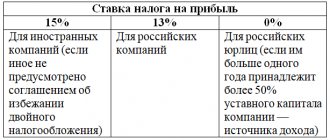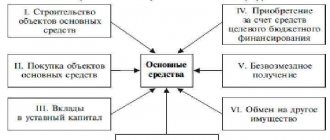Free use: how to save on taxes
Gratuitous use of property (loan, Article 689 of the Civil Code of the Russian Federation) is a fairly common agreement in Russian business practice. Most often, property is transferred for free use (hidden or open) to interdependent organizations.
Unfortunately, from a tax point of view, it is difficult to avoid losses in such a situation: the lender will not be able to charge depreciation on such an object or, for example, take into account the costs of current repairs or reimbursement of the cost of inseparable improvements to the donated property. In addition, the lender will have to pay property tax on the value of the property (since it remains on the balance sheet, clause 1 of Article 374 of the Tax Code of the Russian Federation). Despite the fact that the company does not use this facility and it does not generate income. And the borrower is obliged to pay income tax on the economic benefit virtually received by him from the free use of the object (clause 8 of Article 250 of the Tax Code of the Russian Federation).
Moreover, attempts by any of the parties to the agreement to compensate for tax losses to the other party (for example, to the borrower for income tax or to the lender for property tax and depreciation) only lead to additional difficulties. Tax officials believe that for both companies such costs will be economically unjustified and not aimed at generating income. Consequently, they cannot be taken into account in tax expenses.
Based on this specificity of the gratuitous use agreement, tax planning for the consequences of such a transaction becomes especially important.
The main problem for the borrower is the income tax, which the tax authorities require to pay from the savings on rent
SIZE OF ECONOMIC BENEFITS
As we have already indicated, the main problem for the borrower is income tax, which tax authorities require to pay in accordance with paragraph 8 of Article 250 of the Tax Code of the Russian Federation on rent savings. After all, the user of the property could have paid rent, but received the property for free.
Note that paragraph 8 of Article 250 of the Tax Code of the Russian Federation mainly talks about property received free of charge. There is only a mention of property rights, but there is no clear procedure for determining the tax base. But both the Ministry of Finance and the Supreme Arbitration Court of the Russian Federation are united in their position: taxes must be paid. Income in the form of gratuitously received property rights (in this case, rights of use) is included in the non-operating income of the borrower (information letter of the Presidium of the Supreme Arbitration Court of the Russian Federation dated December 22, 2005 No. 98, letters of the Ministry of Finance dated February 17, 2006 No. 03-03-04/1/125, dated 30.03.07 No. 03-03-06/4/33 and dated 19.04.06 No. 03-03-04/1/359). Therefore, arguing with tax authorities on the issue of whether it is necessary, in principle, to pay income tax on the economic benefits from the gratuitous use of property is currently futile.
However, there are ways to minimize your tax losses. To do this, it is advisable to reduce the estimated amount of economic benefit as much as possible. That is, calculate it in the most beneficial way for the company, and then be able to defend your calculation methodology during verification. Moreover, the Ministry of Finance recognizes the right of the taxpayer (within certain limits) to choose the methodology for calculating the amount of economic benefit from the gratuitous use of property (letters dated 05/07/07 No. 03-03-06/4/54, dated 08/08/07 No. 03-03- 06/1/545).
What options could these be? The Tax Code itself suggests two options (Clause 8, Article 250 of the Tax Code of the Russian Federation). Firstly, this is an assessment of income based on market prices, determined taking into account Article 40 of the Tax Code of the Russian Federation. Moreover, such a calculation must be documented by the taxpayer-borrower himself with information on market prices or an independent assessment. The application of this approach in practice is complicated by the fact that in this case it is incorrect to analyze market prices for renting such property (as, for example, the Ministry of Finance proposes in letter dated 02/04/08 No. 03-03-06/1/77). Indeed, from the point of view of the Civil Code, rent (Chapter 34 of the Civil Code of the Russian Federation) and gratuitous use (Chapter 36 of the Civil Code of the Russian Federation) are different types of contracts.
The second option is also spelled out in paragraph 8 of Article 250 of the Tax Code of the Russian Federation. The basis for calculating economic benefits in the second option is the residual value of depreciable property or the purchase price of non-depreciable property. The possibility of using this option is also allowed by the Ministry of Finance (letter No. 03-03-06/1/545). However, the mechanism for such calculation is unclear - it is not in the indicated letter. After all, it is one thing to pay income tax on the entire residual value of the object (in equal shares during the term of the contract), another thing is to adjust this value for the term of the contract. That is, take as economic benefit the amount of monthly depreciation of the object from the tax accounting of the lender (in this case, the total amount of economic benefit will be equal to the residual value in the share attributable to the term of the contract). Obviously, the latter option is more profitable.
Considering the ambiguity of the provisions of the Tax Code regarding the calculation of economic benefits from a loan (and even the Ministry of Finance admits this in letter No. 03-03-06/4/54), we believe that the company (based on clause 7 of Article 3 of the Tax Code of the Russian Federation) has the right choose the most profitable method for yourself.
Moreover, develop your own, based on the specifics of your activity. EXPERT COMMENT Valery BAKHTIN,
expert of the CG “What to do Consult”: - The calculation method in which the residual value is adjusted for the term of the loan agreement is in fact the only method that can be documented. It is also the most acceptable, since it entails a minimal tax burden.
HOW TO ACCOUNT FOR MAINTENANCE COSTS IN TAX EXPENSES
Problems when transferring property for free use may also arise for the lender. What to do, for example, if, in accordance with the loan agreement (Article 695 of the Civil Code of the Russian Federation allows this), the costs of maintaining the property and maintaining it in proper form are borne by the owner of this property? According to tax authorities, such expenses do not meet the definition of expenses that reduce the income tax base - they are not economically justified and are not aimed at generating income. Therefore, when checking, tax authorities will exclude them (for example, letter from the Federal Tax Service for Moscow dated April 1, 2005 No. 19-11/21525).
Naturally, it is advisable to provide for such a situation already at the stage of concluding an agreement for the gratuitous use of property and not to include such conditions in the agreement.
But what if the dependent company that received the loan simply does not have the means to pay the ongoing expenses of the property? There are several ways to solve this problem without losing money on taxes.
First, you can try to prove that such expenses are aimed at generating income. To do this, you need to conclude agreements of intent (or lease agreements) with a third party. In accordance with which this third party undertakes to lease the specified property of proper quality in the future. In this case, the current repair of the property is preparatory work for renting it out and generating income. And it doesn’t matter if the lease agreement is never concluded - what is important is the company’s real intention to generate income.
“Tax officials often try to refuse the parties to a gratuitous use agreement to account for the costs of repairing the transferred property.”
OPINION PRACTITIONER Ilya ANTONENKO,
financial director of the leasing group (St. Petersburg), leading expert of the National Consulting Company: - Tax authorities often try to deny the parties to a free use agreement the opportunity to take into account for income tax purposes the costs of repairing the property transferred (received) for free use. Based on arbitration practice, if under an agreement for gratuitous use the obligation to repair property is assigned to the borrower, the latter clearly has the right to accept such expenses for profit tax purposes (resolution of the Federal Arbitration Court of the East Siberian District dated July 4, 2007 No. A33-8475/06-F02 -4023/07). As for the situation when similar expenses are borne by the lender under the terms of the agreement, in my opinion, Chapter 25 of the Tax Code of the Russian Federation allows such expenses to be taken into account even in the absence of a preliminary lease agreement for the property transferred for free use. If the property transferred for free use before the conclusion of the loan agreement was used by the lender in activities aimed at generating income (including for servicing a business process, for example, office furniture), it can be argued that after the end of the loan agreement such property will be used by the lender for the same purposes. In order to use the property with the same effect, it is necessary to maintain it in working condition, which explains the economic need for its repair during the term of the loan agreement.
Secondly, the funds needed to maintain the property in proper form can be transferred to a dependent company without tax losses. For example, free of charge (if one company controls the other by more than 50%) or under a loan agreement. It is clear that this method will not help the lender take into account the current costs of maintaining its property in tax expenses, but it will help finance the implementation of such costs by the borrower without losing on taxes.
In order for the borrower not to pay income tax on economic benefits, an element of remuneration can be added to the agreement
COMPENSATION OF THE COST OF INTEGRATED IMPROVEMENTS TO THE LENDEE
In the course of its activities, the borrower can (or is even forced) to improve the received property, for example, reconstruct, re-plan, retrofit, that is, make capital investments, making inseparable improvements. At the same time, if the owner of the property is obliged by contract to reimburse the cost of such improvements, a problem arises - such expenses reduce the income tax base only through depreciation (clause 1 of Article 256 of the Tax Code of the Russian Federation). But the company has no right to charge it on property transferred for free use (clause 3 of Article 256 of the Tax Code of the Russian Federation).
Of course, you can wait until the contract expires and the property returns to the owner’s balance sheet, and then begin to depreciate the inseparable improvements. However, this option is unprofitable for the company, since it will not be able to take into account such expenses for a long time.
Another solution to the problem may be to include in the contract a provision that the cost of inseparable improvements is not compensated to the borrower. In this case, the user of the property will depreciate the capital investment during the term of the contract, based on its useful life (Clause 1, Article 258 of the Tax Code of the Russian Federation). But firstly, if this is an interdependent organization that does not have the necessary financial resources to carry out major repairs, this option is simply not possible. And secondly, the borrower may lose on taxes if the term of the agreement for the gratuitous use of property is shorter than the useful life of the inseparable improvements. This situation can occur, for example, during the redevelopment of an office: the borrower will be able to include the cost of inseparable improvements in tax expenses only in a small part, since the useful life of the building is most often longer than the period of gratuitous use of the premises. If it is decided to compensate for the cost of inseparable improvements, the best option seems to be to transfer such compensation immediately upon termination of the loan agreement (in order to immediately begin to depreciate them - clause 2 of Article 259 of the Tax Code of the Russian Federation and only from that time to start paying property tax on the cost of such improvements - Clause 1 of Article 374 of the Tax Code of the Russian Federation).
For interdependent companies, it is more profitable not to compensate for the cost of inseparable improvements. In this case, the total tax burden of the group of companies will begin to decrease not at the end of the contract, but immediately after the borrower begins to accrue depreciation (clause 1 of Article 258 of the Tax Code of the Russian Federation).
COMPENSATING LOSSES UNDER A LOAN AGREEMENT IS RISKY
As we said above, a company that has transferred property for free use and wants to compensate for its losses (amounts of property tax and depreciation) at the expense of the lender as expenses for maintaining the property, the tax authorities will not accept such expenses. In particular, this conclusion was made by the Federal Tax Service for Moscow in a letter dated 01/09/08 No. 18-11/000184.
According to tax authorities, such expenses for the lender will be unreasonable and should not reduce the income tax base. Tax authorities indicate that the borrower has the right to take into account, for profit tax purposes, expenses associated with the use and maintenance of property received under an agreement for gratuitous use (including if such expenses are reimbursed to the lender under the agreement). However, the calculation of depreciation and payment of property taxes are not such expenses and relate solely to the responsibilities of the lender.
Despite the fact that the tax authorities’ position on this issue is quite controversial (and there is no arbitration practice yet), the inclusion of such conditions in a loan agreement is risky. You will have to defend your case in court. In addition, if the company still wants to receive some money from the user of the property, then why not enter into a lease agreement? Moreover, a contract for gratuitous use, under which any compensation is paid, may be considered by the court to be a sham transaction covering up a lease agreement.
INCOME TAX MAY NOT BE PAID AT ALL
In order for the borrower not to pay income tax on the economic benefits from property received free of charge, an element of remuneration can be included in the agreement. This method was directly suggested by the Ministry of Finance itself in a letter dated January 14, 2008 No. 03-03-06/1/4. Thus, officials referred to paragraph 2 of Article 248 of the Tax Code of the Russian Federation, according to which, for profit tax purposes, property (or property rights, as in our case) is considered received free of charge if the receipt of this property is not associated with the occurrence of counter-obligations on the part of the recipient. Thus, if a company links the transfer of property with some additional conditions (the recipient’s obligation to provide services, carry out work, etc.), it is not considered transferred free of charge, therefore, non-operating income does not arise and the recipient does not have to pay income tax. Such accompanying conditions, for example, may be the obligation to carry out repairs in the received premises, provide consulting services, or carry out activities in the transferred premises in the interests of the lender (for example, produce goods for him). Moreover, it is desirable that these additional conditions follow from the free use agreement.
EXPERT COMMENT Alexander ANISCHENKO,
auditor of Auditorskaya LLC: - Strictly speaking, in such a situation there is no gratuitousness. Thus, Article 423 of the Civil Code of the Russian Federation makes a clear distinction between a paid and gratuitous contract. An agreement under which a party must receive payment or other consideration for the performance of its obligations is compensated. Indeed, the court may recognize the taxpayer’s right to take into account in his tax expenses the costs associated with property transferred for free use (resolution of the Federal Arbitration Court of the Central District dated December 14, 2007 No. A64-1347/07-22). The tax authorities referred to the fact that when determining the income tax base, expenses in the form of the value of property transferred free of charge and expenses associated with such transfer are not taken into account (clause 16 of Article 270 of the Tax Code of the Russian Federation). However, the court decided the case in favor of the company on the basis of paragraph 2 of Article 248 of the Tax Code of the Russian Federation. In the case under consideration, the company transferred the right to use the property free of charge to the partner with the condition that it would be used exclusively for the purpose of manufacturing parts for this company. Compliance with this requirement was documented. The court found such actions to be economically justified and aimed at generating income.
In addition, this method of formalizing relations for the transfer of property for free use is also beneficial to the lender. After all, if for profit tax purposes the use is considered non-gratuitous, the company will be able to continue to depreciate the property (the ban on depreciation of property transferred for gratuitous use is established by clause 3 of Article 256 of the Tax Code of the Russian Federation).
The disadvantage of this method is the fact that after the other party fulfills counter obligations, the transferor will have an income tax base, and the borrower will have a VAT base. However, if such relationships arise from the business practices of the relationships between these companies, the turnover on counter sales (of goods, works, services) may be minimal.
If the property was received by the company on UTII
As for a company that applies the taxation system in the form of UTII, when it carries out business activities subject to such tax, income in the form of premises received free of charge for use, transferred by the sole founder (individual), is subject to corporate income tax (see letter from the Ministry of Finance Russia dated January 31, 2013 No. 03-11-06/3/1935).
Commented document: Letter of the Ministry of Finance of the Russian Federation No. 03-11-11/4042 dated 02/03/2014 “STS: accounting for property received free of charge”
Tax consultant P.R. Sidorov
, for the magazine “Normative Acts”
Guide for the simplified tax system
With this e-book, you will easily understand all the intricacies of the simplified taxation system, competently draw up a balance sheet and financial statements. You will receive the electronic edition immediately after payment to your email. Find out more about the publication >>




